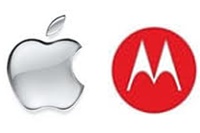Apple - Motorola patent row in court again
12 Sep 2013
Apple and Google subsidiary Motorola Mobility yesterday presented their arguments in court over whether a judge should reopen a lawsuit in which the companies accused each other of illegally using their patented mobile phone technology, Reuters reports.
 The case under review goes back to 2010 with the filing of patent infringement lawsuits against each other by the two smartphone makers.
The case under review goes back to 2010 with the filing of patent infringement lawsuits against each other by the two smartphone makers.
The companies had filed dozens of such lawsuits around the world for protecting their technology.
Apple argued that Android phones made using Google software copied elements of its iPhones.
The case saw Apple accuse Motorola Mobility, which had since been bought by Google, of infringing four patents. Motorola retaliated by accusing Apple of infringing a standard essential patent, one necessary for making a mobile phone work.
The cases had been consolidated at the US District Court for the Northern District of Illinois, with judge Richard Posner, dismissing it in June before trial, saying that neither company had sufficient evidence to prove their case.
Motorola Mobility filed an appeal for reopening the case. According to commentators, the Federal Circuit appeals court might take days or months to issue a decision.
In the hearing yesterday, many of the questions from a three-judge panel concerned whether the companies had carried out due diligence to hammer out deals to license each others' patents, or whether one or the other was an "unwilling licensee."
An "unwilling licensee", in legal parlance, was a company that would not seriously negotiate paying to license a patent that it infringed. Such a company could face an order banning the sale of products that used the patented technology.
Apple lawyer E Joshua Rosenkranz argued that the iPhone maker had stronger patent claims than Motorola with the panel appearing receptive to notable parts of his case, The Wall Street Journal reported.
Chief judge Randall Rader suggested that judge Posner had made ''significant'' errors in the interpretation of at least one of Apple's patents and in concluding that its patents involved minor phone features that competitors could easily design around.
All three judges appeared to question whether judge Posner had done the right thing in throwing out Apple's damages claims. It was less clear though as to whether the court believed that another chance be given to Apple to bring an injunction barring the sale of certain Motorola devices.
It also was also not clear whether Motorola would be able to revive any part of its case against Apple. The company's bid for an injunction was one of the most keenly followed aspects of the case.


















